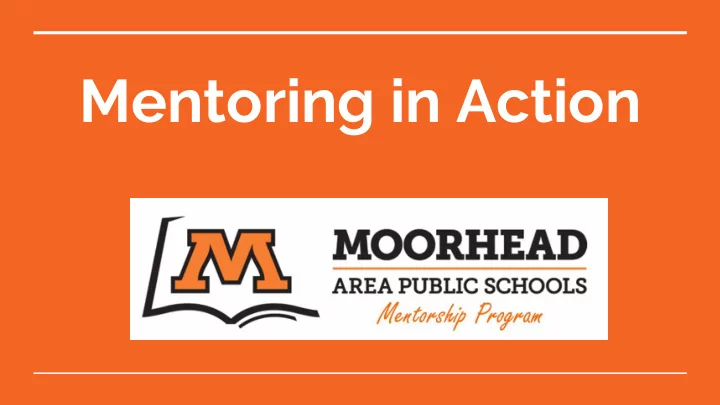

Mentoring in Action
Outcomes Attendees will... 1. Understand mentor program components that support novice teachers 2. Consider how these methods could be utilized to foster the development of teachers
Introductions Missy Eidsness Shirley Johnson Sue Knorr Eileen Weber eweber@lcsc.org retrieved from www.teachers.net
Why? Up to 50% of new teachers leave the profession within the first five years. Beginning teachers make up a greater percentage of today’s school faculty than at any other time in the last twenty years, Mentoring programs are being highlighted as a way to ... improve teacher retention rates ● increase teacher effectiveness ● support student learning ● foster reflective practitioners ●
History of Mentoring at Moorhead
How? Outside personnel (seasoned educators) are intentionally chosen as ● mentors in this program. ● Supports teachers without being evaluative ● Mentors keep building administrators abreast of mentorship activities, but do not disclose specific information about mentees. ● If principals/mentors have concerns about a new teacher, additional collaboration may be encouraged by team members
Classroom Observation Cycles Twice a year, regularly ● scheduled classroom visits by mentor ● Pre-observation conference Observation ● ● Post-observation reflective conference Non-evaluative, reflective, share best practices
Small Group Sessions
Learning Walks Snapshot of what is happening in veteran teacher classrooms ● Charlotte Danielson/SIOP Framework ○ Mentees have two learning walks per year with their mentor ● Group “walk” - half day sub ○ ○ Individual “walk” - spring, during teacher prep time Protocol of learning walks ● ○ Look for specific evidence of values of MPS (SIOP, Charlotte Danielson) Talk with students ○ Debrief - Talk about evidence collected (no names) ○
Large Group Sessions
Veteran Teacher Panel Specific district veteran teachers invited to participate in panel ● ○ Chosen to represent grade levels, subject areas, SPED, ELL, admin, etc. ● Separate secondary group and elementary group Begin with specific prepared questions for panel ● (Examples on next page.) Mentees question and discussion time with panel ●
Sample Questions for Veteran Panel 1. What is something important you have learned in your time in the classroom? Please share advice you wish you had known, recall a mistake from which you learned, or describe transformational experiences that have come over time. 2. Describe a time when you experienced something in the classroom that you just couldn’t have learned in a college course. How did you make it through that experience? What resources did you rely upon? 3. Share an experience how you and your students benefit when you collaborate with others. This collaboration may include classroom teachers, special education teachers, paraprofessionals, administrators, counselors, support staff or parents. 4. Describe strategies you use in lesson development. What are some of the “best practices” that really work to make learning experiences effective for students? 5. Classroom management is often an important area of concern for new educators. What are some of your top management strategies and tips? 6. Maintaining work/life balance is crucial to a teacher’s success. What advice can you offer new teachers in this regard? 7. Organization is an important part of a new teacher’s skill set. What strategies do you rely upon to help you maintain a sense of organization?
Book Discussion
Changes We’ve Made Coordinator Mentors from outside the district Less large group sessions Added special ed mentor Increase principal communication and participation Developed consistent forms Mentor training on district priorities
Funding Logistics CEUs How much does it cost? learning walks Where does the money come from? small and large groups pre/post observations conferences Pay Estimate 12 hours per 1st year mentee time outside of contract (not prep) and 4 hours per 2nd year mentee $27.34 an hour
Questions?
Recommend
More recommend